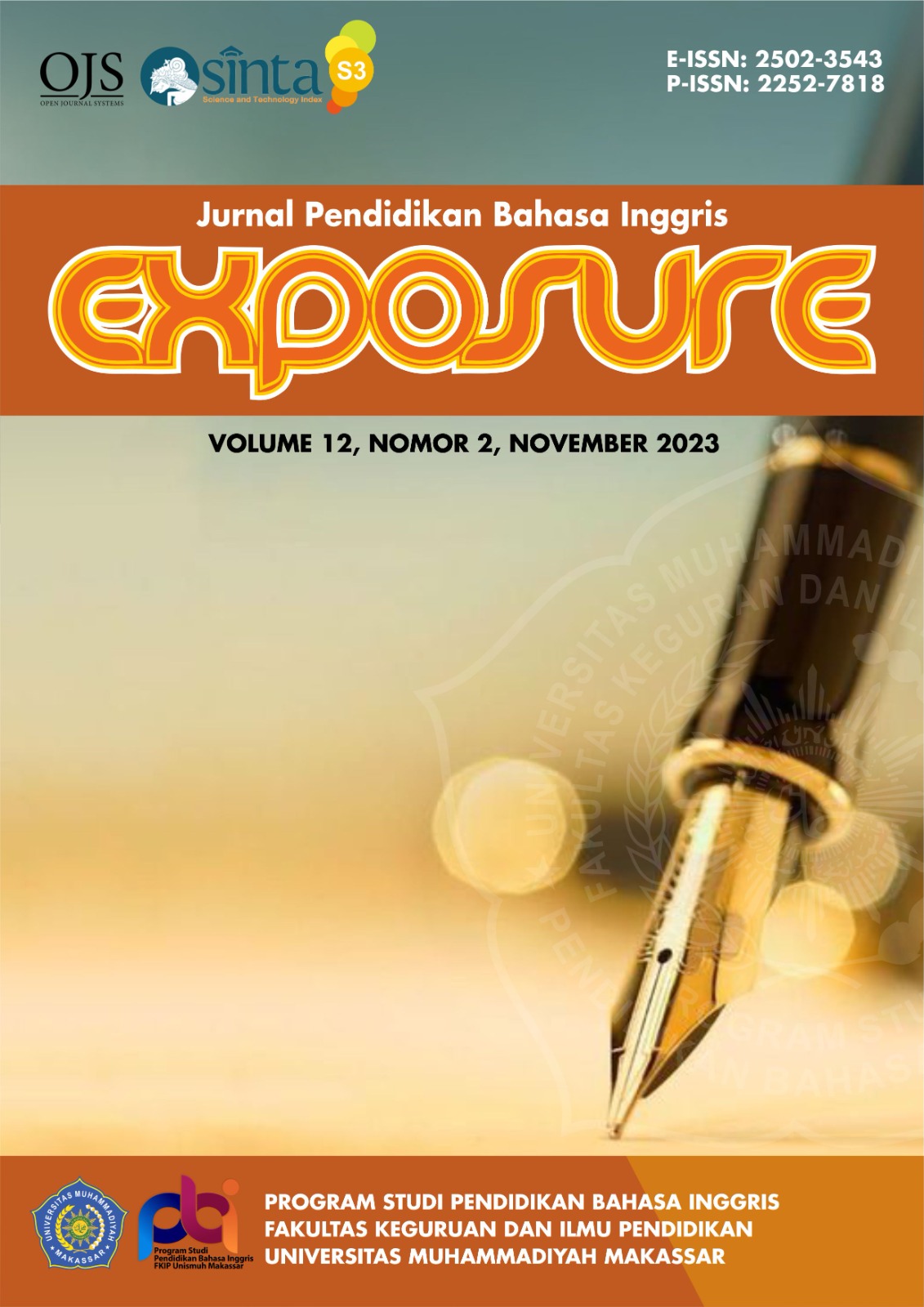CORRELATION OF SOCIAL EMOTIONAL LEARNING WITH THE USE OF FLIPPED CLASSROOM METHOD IN LEARNING LISTENING
DOI:
https://doi.org/10.26618/exposure.v12i2.12320Keywords:
Social Emotional Learning, Flipped Classroom, ListeningAbstract
The aim of this research is to find out the correlation between social emotional learning and the use of the flipped classroom method in English listening learning and to know the use of Social Emotional Learning in the application of the flipped classroom method affects English listening learning. This research used correlational research method. The subjects of this research were students of the 2021/2022 and 2022/2023 batches of the English Education study program at Iqra Buru University, totalling 35 students. The data collection technique used in this study was a questionnaire that distributed using Likert Scale. The data in this study was analysing used correlation analysis techniques in the IBM SPSS Statistic 23. Validation test has been done with the results stating that all statements in the questionnaire were valid. After calculating all valid statements, the reliability coefficient for the Social Emotional Learning questionnaire was 0,855 and the reliability coefficient for the Flipped Classroom questionnaire is 0.934. The result of this research was the significant 2-taild is 0,000 < 0,05 means that social emotional learning (SEL) and flipped classroom method are correlate. Besides that, the value of pearson correlation is 0,736 means that social emotional learning and flipped classroom has strong correlation and positive. The conclusion of this research is social emotional learning and the use of flipped classroom method in learning listening is correlate with strong positive correlation.
References
Araúz-Ledezma, A. B., Massar, K., & Kok, G. (2022). Implementation of a school-based Social Emotional Learning Program in Panama: Experiences of adolescents, teachers, and parents. International Journal of Educational Research, 115. https://doi.org/10.1016/j.ijer.2022.101997
Basith, A., Syahputra, A., Fitriyadi, S., Rosmaiyadi, F., & Triani, S. N. (2021). Academic stress and coping strategy in relation to academic achievement. Cakrawala Pendidikan, 40(2), 292–304. https://doi.org/10.21831/cp.v40i2.37155
Gustian, K., Darmah, A., & Rusmawaty, D. (2023). The Benefits of Flipped Classroom Model for Efl Learners. Journal of Education [Internet], 5(4):13918-35. Cite on 8 April 2023 https://jonedu.org/index.php/joe/article/view/2411
Ihsan, M., Ma’mun, A., & Yusup, U. (2019). Pengembangan Social Emotional Competencies Melalui Outdoor Education. Jurnal Penelitian Pendidikan, 19(2) 274–85: https://doi.org/10.17509/jpp.v19i2.19772
Lapidot-Lefler, N. (2022). Promoting the use of Social-Emotional Learning in Online Teacher Education. International Journal of Emotional Education, 14(2):19-35. https://doi.org/10.56300/HSZP5315
Nasriani. (2022). Efektifitas Pembelajaran Daring pada Masa Pandemi Covid 19 di Mts Negeri 2 Tolitoli. Jurnal Inovasi Penelitian, 2(8), 2501-2510. doi: 10.47492/jip.v2i8.1128
Nurmaya, G. A. L., Irsan, Sufinuran, & Fauziah, R. (2022). Analisis Perkembangan Perilaku Sosio-Emosional Siswa dalam Pelaksanaan Pembelajaran Secara Daring (Online) di Sekolah Dasar. Jurnal BASICEDU, 6(1): 943-953. https://doi.org/10.31004/basicedu.v6i1.2062
Sazdovska-Pigulovska, M. (2021). Impact of online education on student emotional well-being. ERL Journal, 2(6), 6-23, https://doi.org/10.36534/erlj.2021.02.01
Thatphaiboon, R., & Sappapan, P. (2022). The Effects of the Flipped Classroom through Online Video Conferencing on EFL Learners’ Listening Skills. Arab World English Journal, 13(3): 89-105 doi: https://dx.doi.org/10.24093/awej/vol13no3.6
Vestadand, L., & Tharaldsen-Kjersti, B. (2022). Building Social and Emotional Competencies for Coping with Academic Stress among Students in Lower Secondary School. Scandinavian Journal of Educational Research, 66(5):907–921 https://doi.org/10.1080/00313831.2021.1939145
Yilmaz-Abali, B., & Yazici, H. (2020). An evaluation on determining the relation between listening skill and social emotional learning skill. Eurasian Journal of Educational Research, 89: 71-92, doi: 10.14689/ejer.2020.89.4
Downloads
Published
Issue
Section
License
Authors who publish with this journal agree to the following terms:
In order to assure the highest standards for published articles, a peer review policy is applied. In pursue of the compliance with academic standards, all parties involved in the publishing process (the authors, the editors and the editorial board and the reviewers) agree to meet the responsibilities stated below in accordance to the Journal publication ethics and malpractice statement.
Duties of Authors:
- The author(s) warrant that the submitted article is an original work, which has not been previously published, and that they have obtained an agreement from any co-author(s) prior to the manuscript’s submission;
- The author(s) should not submit articles describing essentially the same research to more than one journal;
- The authors(s) make certain that the manuscript meets the terms of the Manuscript Submission Guideline regarding appropriate academic citation and that no copyright infringement occurs;
- The authors(s) should inform the editors about any conflict of interests and report any errors they subsequently, discover in their manuscript.
Duties of Editors and the Editorial Board:
- The editors, together with the editorial board, are responsible for deciding upon the publication or rejection of the submitted manuscripts based only on their originality, significance, and relevance to the domains of the journal;
- The editors evaluate the manuscripts compliance with academic criteria, the domains of the journal and the guidelines;
- The editors must at all times respect the confidentiality of any information pertaining to the submitted manuscripts;
- The editors assign the review of each manuscript to two reviewers chosen according to their domains of expertise. The editors must take into account any conflict of interest reported by the authors and the reviewers.
- The editors must ensure that the comments and recommendations of the reviewers are sent to the author(s) in due time and that the manuscripts are returned to the editors, who take the final decision to publish them or not.
Authors are permitted and encouraged to post online a pre-publication manuscript (but not the Publisher’s final formatted PDF version of the Work) in institutional repositories or on their Websites prior to and during the submission process, as it can lead to productive exchanges, as well as earlier and greater citation of published work (see The Effect of Open Access). Any such posting made before acceptance and publication of the Work shall be updated upon publication to include a reference to the Publisher-assigned DOI (Digital Object Identifier) and a link to the online abstract for the final published Work in the Journal.

